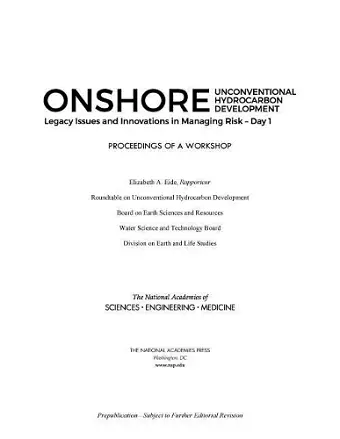Onshore Unconventional Hydrocarbon Development
Legacy Issues and Innovations in Managing Risk—Day 1: Proceedings of a Workshop
Division on Earth and Life Studies author Board on Earth Sciences and Resources author Water Science and Technology Board author National Academies of Sciences, Engineering, and Medicine author Roundtable on Unconventional Hydrocarbon Development author Elizabeth A Eide editor
Format:Paperback
Publisher:National Academies Press
Published:23rd Aug '18
Currently unavailable, and unfortunately no date known when it will be back

Oil and gas well completion and stimulation technologies to develop unconventional hydrocarbon resources in the United States have evolved over the past several decades, particularly in relation to the development of shale oil and shale gas. Shale oil and shale gas resources and the technology associated with their production are often termed "unconventional" because the oil and gas trapped inside the shale or other low-permeability rock formation cannot be extracted using conventional technologies. Since about 2005, the application of these technologies to fields in the U.S. have helped produce natural gas and oil in volumes that allowed the country to reduce its crude oil imports by more than 50% and to become a net natural gas exporter. The regional and national economic and energy advances gained through production and use of these resources have been accompanied, however, by rapid expansion of the infrastructure associated with the development of these fields and public concern over the impacts to surface- and groundwater, air, land, and communities where the resources are extracted.
The intent of the first day of the workshop of the National Academies of Sciences, Engineering, and Medicine's Roundtable on Unconventional Hydrocarbon Development was to discuss onshore unconventional hydrocarbon development in the context of potential environmental impacts and the ways in which the risks of these kinds of impacts can be managed. Specifically, the workshop sought to examine the lifecycle development of these fields, including decommissioning and reclamation of wells and related surface and pipeline infrastructure, and the approaches from industry practice, scientific research, and regulation that could help to ensure management of the operations in ways that minimize impacts to the environment throughout their active lifetimes and after operations have ceased. This publication summarizes the presentations and discussions from the workshop.
Table of Contents- Front Matter
- 1 Introduction
- 2 Understanding Legacy Issues and Managing Risk
- 3 Infrastructure Inventories, Environmental Restoration, and Management
- 4 Observations, Monitoring, and Technology Evolution and Revolution for Legacy Issues
- 5 Intersection of Technology and Regulation: Smoothing the Interface Through Time
- 6 Plenary Remarks and Discussion
- References
- Appendix A: Workshop Agenda
- Appendix B: Biographies of the Workshop Planning Committee
- Appendix C: Biographies of the Workshop Moderators and Presenters
- Appendix D: Members of the Roundtable on Unconventional Hydrocarbon Development
- Appendix E: Workshop Participants
ISBN: 9780309474245
Dimensions: unknown
Weight: unknown
100 pages